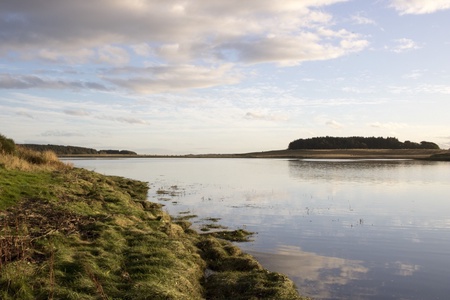Groundwater nitrate levels in the River Ythan catchment continue to breach environmental limits in some areas and pose a threat to local wildlife in the Ythan estuary, a new study has found.
The research by scientists at the University of Aberdeen also established a risk to private water supplies and ecosystems in some parts of the wider catchment.
However, the study also found that despite these challenges groundwater quality is on track to recover by the end of the decade thanks to ongoing efforts curb nitrate pollution.
Researchers from the School of Geosciences assessed efforts to combat nitrate levels in the area which was designated as Scotland's first major Nitrate Vulnerable Zone (NVZ) in 2000.
They employed a range of techniques to understand the pattern in groundwater nitrate levels, including through integration of long-term monitoring data, groundwater sampling, satellite imagery, and geological conditions.
Their findings revealed that while there have been major improvements in surface water quality and progress has been made to improve groundwater quality, elevated nitrate levels persist in numerous locations within the catchment and often exceed regulatory limits because of the longer time it takes for groundwater to move through the subsurface.
As a Site of Special Scientific Interest (SSSI) and a Ramsar wetland of international importance, the study is important for the Ythan estuary and for the wider Ythan catchment which has one of the highest reliance on private water supplies from groundwater in Scotland.
Rising nutrient levels (primarily nitrates originating from agricultural fertilisers) have led to excessive algae growth which has hindered the access of wading birds to invertebrates, their primary food source.
The study emphasises the need for increased financial incentives encouraging farmers to maintain low-intensity grasslands, which have shown significant improvements in groundwater quality benefiting local biodiversity.
PhD student Hamish Johnson was the lead author of the study which is funded by the Natural Environment Research Council (NERC) QUADRAT DTP and published in the Environments journal.
Hamish said: “We used a range of innovative techniques that have provided valuable insights into the influence of local geology, soils, and land use on groundwater nitrate levels.
“These have shown that although nitrate levels in shallow groundwaters have demonstrated some improvement over the past two decades, they remain elevated due to the time lag associated with the movement of groundwater through the subsurface.”
He continued: “Twenty years after the River Ythan was designated as Scotland's first major NVZ, followed by subsequent efforts to reduce fertiliser use, our study is the first to assess the impact of measures to improve groundwater quality.
“While surface water quality has improved, groundwater quality – which is essential for private water supplies and aquatic ecosystems – is recovering at a slower pace but is expected to recover by the end of the decade."
Dr. Jean-Christophe Comte, senior lecturer in Hydrogeology and the research project’s supervisor, added: “The results provide a critical foundation for understanding the challenges faced by the estuary and wider surface and groundwaters in north-east Scotland and what needs to happen to safeguard their ecological balance as well as private water supplies – such as encouraging the use of low-intensity grasslands which we show has led to an improvement in groundwater quality.
“It also underlines the need for continued collaboration between researchers, policymakers, and land managers to implement effective strategies that protect and restore groundwater quality to ensure the sustained health of the Ythan estuary's important ecosystem.”


